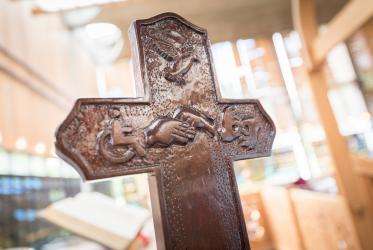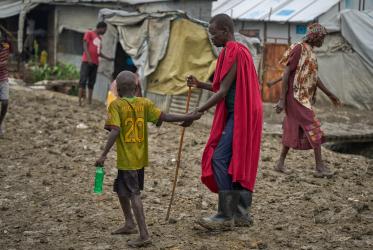Photo available - see below
by Henrike Mueller (*)
Astrid Berner-Rodoreda is an advisor for HIV/AIDS in Africa at Bread for the World and at the same time spokeswoman of the "Action Alliance against AIDS". This grouping of the German partners of the Ecumenical Advocacy Alliance, an international action alliance of church and church-linked organizations, includes more than 70 non-governmental organizations working in different ways on the issue of HIV/AIDS by seeking to make a joint contribution to overcoming this global issue.
In this interview she is talking about women and girls as a risk group in particular danger of HIV infection and about the importance of church-related organizations in the struggle against HIV/AIDS.
---The theme of World AIDS Day 2004 is "Women, Girls, HIV and AIDS". For the second time since 1990, women are the focus. Why are women and girls, especially in Africa, a risk group in particular danger of HIV infection?
One important factor is the lack of equality between women and men. In many parts of Africa, the man acquires the right to the woman’s sexuality through marriage. Usually, married women have little right to take part in decision-making about when, where or how often they wish to have sexual intercourse in marriage. It is very difficult therefore for a woman to protect herself against infection. Besides, condoms in Africa are still not widely accepted as a form of contraception, and presuppose that men are willing to use them. Condoms are automatically seen as being linked to HIV/AIDS. In addition, because of the greater surface area and susceptibility to injury of the vaginal membranes, the risk of women becoming infected through unprotected sex is twice as high as for men
Young girls are often married to older men who have already been sexually active for many years. There is a relatively high risk that, over the years, they have become infected and that they will infect their wives. In southern Africa, the region most affected by HIV/AIDS, many men from rural regions are forced for economic reasons to earn their living in cities and mines. So, for a large part of the year, they are not at home. If during these long separations they engage in sexual relations and become infected, they infect their wives when they return to the village.
---So gender plays a great role?
So far, women have had few possibilities to protect themselves. What is at issue therefore is being able to talk openly in families and between couples about sexuality and the situation of women and men. The gender issue is just as relevant in treatment as in prevention. It's a question of women having the same access as men to anti-AIDS drugs. And of course, for us in Germany, it is a question of pointing to the specific vulnerability of women. The situation of women plays a major part in our publications. Our current newsletter has a strong focus on women, providing information about their situation, and it particularly gives a voice to women who live with the virus.
One of the partners in a women's project in a rural area noted: "To start with, we only worked with women on HIV/AIDS prevention. But then we noticed that the issue of HIV/AIDS was not raised at home at all by the women. It then became clear that we had to work with men if we wanted to change behaviour." The target group in HIV/AIDS must at all costs include men.
---What specific measures is the "action alliance against AIDS" using to improve the situation of women and girls?
For the action alliance, it is a question of ensuring that people who are HIV-positive receive the treatment they need at a reasonable cost. The latest statistics from UNAIDS make clear that 9 out of 10 people who require anti-AIDS drugs do not receive such treatment, and the majority of them live in Africa.
We are exerting pressure on the German government to provide increased funding for the fight against HIV/AIDS – I’m pleased to say that, a few days ago, the German government increased its contribution to the Global Fund in 2005 to 82 million euros. We see this as part of the success of our work.
We also are targeting the pharmaceutical companies to produce low-cost anti-AIDS drugs and to support the production of generic versions by providing licences.
---To what extent can women themselves assume responsibility for their situation?
It is important that women know the facts about HIV/AIDS, that girls learn to say " no" to unwanted sexual intercourse and find support amongst their peer group and in their schools. Many programmes that we support also aim at improving the economic status of women, so that they can escape poverty.
There are numerous churches and church congregations, diaconal institutions, church mission and ecumenical bodies that are members of the ecumenical action alliance. To what extent do they see their work in the fight against AIDS as part of the advocacy work of the church?
Work with church partners is an important part of our work. Simply the fact that of the approximately 40 million people with HIV/AIDS, 30 million are Christians, means that we have to get churches to take action. The church is just as affected by AIDS as society around it. If we can get the churches to fight the illness rather than those who are ill, then we will have achieved a lot. If people who are HIV-positive are integrated into church life, or if pastors can speak openly in their parishes about being HIV-positive themselves, then we will have achieved a great breakthrough.
We believe that the church has to stand up for those who are excluded from society, and the church also has a responsibility to look self-critically at its own role and make changes where it has discriminated against or excluded or condemned people.
---What is the significance of the ecumenical dimension of the work, the fact that groups from different churches and denominations are working together?
The ecumenical HIV/AIDS initiative is one of the most important programmes for the Africa work of Bread for the World. It brings together church leaders from different countries and denominations. A visit to a different church, which has learned to deal openly with HIV/AIDS, can work miracles - many of the bishops, church leaders, general secretaries of church councils in Africa who are active in HIV/Aids work were "converted" through South-South exchanges.
Ecumenical networks like the Ecumenical Advocacy Alliance or national networks such as our action alliance against AIDS, also play an important role in the North. As members of a network, we can be far more successful in our lobbying and advocacy work than as organizations and churches acting alone.
---For African churches, the fight against AIDS represents a particular challenge because it touches on sensitive issues such as sexuality or the equality of women and men. How do you, against this background, organize co-operation with local church partners?
HIV/AIDS forces the churches to put issues on the agenda that to a great extent are taboo in society and especially in the churches. We try to support our partner organizations to take the courageous step of bringing up for discussion those things that, for cultural and social reasons, are rarely openly addressed. How are women treated in the marriage? Is it enough to preach abstinence and faithfulness - what does the reality look like, especially for women? Does a man really have to be so sexually experienced to be considered a man? As churches, are we really protecting our young people when we preach and expect only abstinence, thereby expecting this demand to become reality? How can we as churches prevent more people becoming infected by the virus?
In this area, discussions with churches that have already followed this path are of great value, as is cooperation with church organizations of people who are HIV-positive.
---What particular opportunities do non-governmental organizations have, in this case especially church-linked organizations, compared to the state-linked anti-AIDS work?
I think NGOs and churches are closer to the people concerned. Therefore, they have important tasks in education, advice, care and preparation for treatment. Churches are mostly particularly active when it comes to care.
So we have to ensure that everyone is linked together in the Anti-AIDS work, and that everyone can play their role. Church and secular NGOs can campaign for the state to become active in treatment and in provision of low-cost drugs. The NGOs themselves are unlikely to be able to implement such a programme, given the huge cost and the necessary medical infrastructure. Churches and church organizations contribute a great deal to forming public opinion – so in this area, we have to ensure that the work of churches and church organizations is based on accurate information and not on discriminatory behaviour. That churches and NGOs play an important role has been recognized by UNAIDS, the Global Fund and other international organizations. Ever more international organizations want to see that churches and church and/or religious organizations receive funds for their anti-AIDS work. A representative of UNAIDS is an advisor on the steering group of the ecumenical anti-AIDS initiative in Africa - a clear indication of the importance for UNAIDS of this initiative.
---What barriers do you encounter?
One issue which churches find difficult is the promotion of condoms as protection against HIV infection. But here, there are also ways of dealing with this: churches and church organizations can ask a nurse or a representative from a secular agency to provide information about condoms and how they are used. Networking and the readiness to work with others is thus extremely important in the fight against HIV/AIDS.
What contribution can be made by church congregations and grass-roots groups that want to combat AIDS?
One thing we can do while based in Germany is to support the efforts of our partners, by campaigning to ensure that all who need anti-AIDS drugs are able to receive them at a reasonable cost. Church congregations and grass-roots groups are called to present these demands to the government and the pharmaceutical industry, to join our alliance, but also to work for openness about HIV/AIDS in their own congregations and ensure that people with HIV are no longer excluded, but integrated.
A free high resolution photo is available at
wcc-coe.org/wcc/what/mission/astrid.html
More information on the topic under
www.aids-kampagne.de/english/index.html
(*) Henrike Mueller is a curate of the Evangelical Lutheran Church of Hanover (Germany) working in the office media relations of the World Council of Churches.
Opinions expressed in WCC Features do not necessarily reflect WCC policy. This material may be reprinted freely, providing credit is given to the author.






